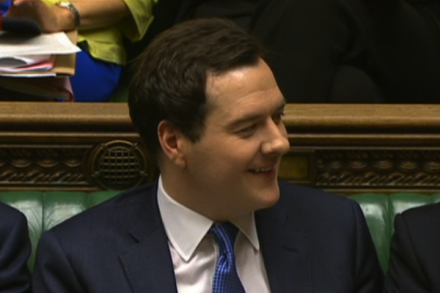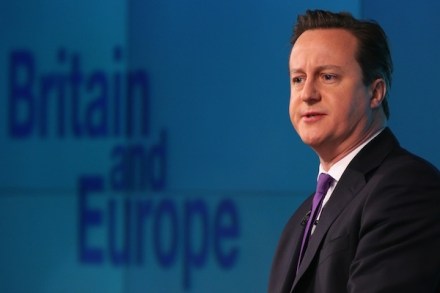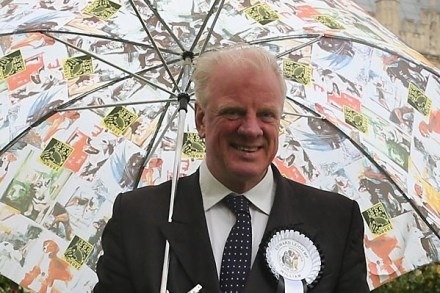George Osborne’s 2013 spending review speech
listen to ‘Spending review 2013: the Coffee House analysis’ on Audioboo

Read about the latest UK political news, views and analysis.
listen to ‘Spending review 2013: the Coffee House analysis’ on Audioboo


Julia Gillard has lost a leadership ballot in the Australian Labor Party to former Prime Minister Kevin Rudd. She called the contest to bring an end to the battles in her party – and in doing so has lost her job. Before the vote, she said: ‘Anybody who enters the ballot tonight should do it on the following conditions: that if you win you’re Labor leader, that if you lose you retire from politics.’ She added that ‘tonight is the night’. But the official results, announced in the last few minutes, saw Rudd taking 57 votes, and Gillard only 45.

One set of businesses are already feeling the pain from the successful completion of the spending review. Westminster pizza outlets have come to rely on large orders from the Treasury the night before a spending review or Budget announcement, but the deal was sealed on Sunday night, and so all was calm last night in Westminster. George Osborne still snuck in a cheeky burger and chips (and thought it a good idea to tweet a slightly unappetising picture of himself tucking in), but that was as he made his finishing touches to the speech itself, rather than an attempt to keep going through last-minute negotiations with an angry Cabinet colleague.
Do you understand what David Cameron’s Europe policy is supposed to achieve? If so, you’re way ahead of me. I’ve said before that I think Europe will cripple Cameron unless Ed Miliband gets there first and nothing has happened since to change my mind. Isabel’s scoop published today, revealing the results of the Tory party’s internal consultation help make the folly of Cameron’s policy even clearer. With some understatement Isabel concludes that the results “underline how big the expectations are on Cameron to bring about big change in Europe”. Indeed they do. Tory members are telling the Prime Minister that the European parliament should be abolished. This may not be

The Tories are putting off Labour MPs from backing their Private Member’s Bill on an EU referendum with an overly partisan campaign, Coffee House has learned. John Cryer, who chairs Labour for a Referendum, tells me that he won’t be voting for the Bill because the Conservatives have turned it into a party political campaign to shore up their own position, rather than one that genuinely promotes a referendum. He says: ‘I’m not voting for it, I’m abstaining. I think the way the Tories have approached it is very party political. I can understand it in a way because they want to be in a position where they are offering


David Cameron will come under increasing pressure in the next few months to publish his ‘shopping list’ of reforms he wants from a renegotiation of Britain’s relationship with Europe. Even those who want to know what the Prime Minister is really thinking accept that this is not a good idea, as he would neither satisfy the spectrum of views across his party, nor impress them when he returned with only 14 out of 20 demands granted (even if those 14 reforms were very impressive ones). But the Tory party has been consulting its members on the powers that they would like to see returned to national governments. I’ve got hold

The Tories have earned rare praise for their LetBritainDecide campaign for James Wharton’s Private Member’s Bill. Everyone accepts that the slick website and social media campaign are (surprisingly) impressive. But there’s another — largely unnoticed — aspect to this campaign which has a lot less to do with change in Europe and more to do with change in CCHQ’s campaigning methods. The clever ‘co-sponsorship’ option allowing anyone to add their names to the bill doesn’t just create hype, it also allows CCHQ to build a large database of the names, email addresses and postcodes of voters with a particular interest in European affairs. Why is this important? The data allows CCHQ

Strangely, both sides at Treasury questions today wanted to talk about something that does their own party no favours at all to mention. The Labour whips had sent their loyal backbenchers out in force to ask about Friday’s borrowing figures, while George Osborne and Conservative colleagues were very happy indeed to talk about how much the Opposition would have to borrow, too. Labour wanted to tell off the government for borrowing more. The government wanted to remind Labour that it would borrow even more. When it comes to performing elaborate and quite painful-looking contortions, Ed Balls is a master, but even he must realise that telling off another party for borrowing

Sir Mervyn King held an emotional farewell with the Treasury Select Committee this morning ahead of his move from the Bank of England to the House of Lords. Committee chair Andrew Tyrie was as keen to recruit him as a supporter of banking reforms going through Parliament in the future as he was to grill the outgoing Governor: in fact, all the of the MPs on this often incisive committee were reasonably gentle with the man known as Merv the Swerv. As part of his farewell, he gave some advice to his successor which sounded a little bit like a L’Oréal advert: ‘Well, I have no intention of giving public

There’s talk this morning of the intelligence budget taking a cut in tomorrow’s spending review announcement, but what about the legislation that the spooks say they really need to do their jobs properly? The row about the Communications Data Bill has calmed a little in the past week or so, but that’s not to say that those pushing the proposals have given up. I understand that though the bill’s Conservative proponents accept that Nick Clegg really will not be moved, they don’t think this is the end of the road for the legislation in this Parliament. Instead, figures close to the talks are mulling introducing it after the 2014 Budget.
The Clinton aide James Carville was once asked that, were he to be reincarnated, what he’d like to come back as. “I used to want to come back as the president or the pope or a .400 baseball hitter,” he replied. “But now I want to come back as the bond market. You can intimidate everybody.” The bond market has a huge power over George Osborne, whose entire project is based on being able to borrow at rock bottom rates. A month ago, the Chancellor was being charged just 1.9pc on new loans. As of today, it has shot to 2.53pc. Look at how the market has behaved in recent weeks:-

David Cameron was quick to condemn the alleged attempt by police to ‘smear’ the family of Stephen Lawrence this morning, while Home Secretary Theresa May was quick to tell Parliament of the government’s plans to ensure that these claims are properly investigated. You can listen to May’s statement here, and read it in full here. listen to ‘Police smear campaign against Lawrence family: Theresa May’s statement’ on Audioboo


Michael Gove and his colleagues have enjoyed poking Labour on education policy recently. His catty letter exchange with Stephen Twigg last week left Twigg with the victory for style with a supremely bitchy reply, while Gove won on substance (largely because he asked whether Labour’s education frontbench possessed any). Today he tried to assemble his own fantasy Labour education team as he took questions from MPs in the House of Commons chamber. Kate Hoey gave him a forthright prod about the delay in a school converting to an academy in her constituency. Gove didn’t really answer her question, instead saying: ‘I’m very grateful to the honourable lady. She’s a brilliant

David Laws’ decision to hand Liam Byrne’s infamous ‘there’s no money’ note to ITV is intriguing. It suggests that the Liberal Democrat leadership intend to escalate their attacks on Labour. Laws must know the power of this image. For when he first mentioned it at an early Osborne/Laws press conference, Andy Coulson pushed hard for an image of the actual note to be released. Coulson calculated that the note would have made nearly all the front pages and established the image of Labour profligacy in the public’s mind. But Laws, slightly taken aback by the level of interest in the note, refused to hand it over. At the time, friends

Ministers are clearly mindful of the potential damage that Tim Loughton’s amendment to the Finance Bill calling for tax breaks for married couples could cause. This is one of those issues that could become a rebellion if it is poorly-managed by the leadership, or equally could be a bit of a damp squib if enough backbenchers are reassured and feel they should show loyalty to George Osborne. David Gauke has sent out a letter to Tory MPs trying to do just that. This ‘dear colleague’ message, which I’ve been passed, tells backbenchers that the Chancellor will announce the details of a transferable tax allowance ‘in due course’, which is what the
The Treasury is keen to downplay any sense of drama surrounding the spending review. On Marr this morning, George Osborne declared that he was ‘confident’ that he and Vince Cable would agree the BIS budget ‘in short order.’ He emphasised that the differences between them were not that large. Indeed, I’m informed that the differences between Treasury and BIS are over capital not current spending, making them easier to resolve. Osborne and Cable have only begun to speak directly in recent days. Up until Thursday, Osborne had been leaving the negotiations to Danny Alexander. Despite Osborne’s protestations, it looks like the BIS budget will go down to the wire. Cable

Both Ed Miliband and Nick Clegg delivered speeches to their party faithful today about being realistic about 2015. Miliband’s speech, briefed as ‘tough’, was the latest in his series of attempts to tell voters that they can trust him: he wouldn’t borrow more than this government… well, no more ‘day-to-day spending’, which is his way of saying he would actually borrow more for capital projects. Clegg wanted to tell his councillors that they can’t see May 2015 as the month when they all get to breathe a sigh of relief and return to their local authority fiefdoms without any of the inconvenience of their party being in national government too.


In setting up the Leveson Inquiry, David Cameron made a major mistake. He accepted the premise – so powerfully advocated by Murdoch’s rivals – that hacking was a problem because the Dirty Digger was so wicked. The inquiry should have been into the black market for illegal information, of which the hacking scandal exposed a tiny part. Hacking is done by skip tracers, a phrase you never heard in the inquiry because it acknowledges the existence of a wider industry. Buyers are insurance companies, policemen, cuckolded husbands – anyone. The Spectator is (as far as I’m aware) the only publication to have drawn attention to the fact by running a
It is traditional for me, at this season, to remind readers of the Prince of Wales’s prophecy, spoken in Brazil in March 2009. His Royal Highness warned that the world had ‘only 100 months to avert irretrievable climate and ecosystem collapse’. So only four years now remain. But as I write, the Met Office is meeting in Exeter for an unprecedented summit to work out why it has predicted for the past 13 years that the British climate will get warmer only to find, in 12 out of the 13, that it has got colder. No one is admitting, of course, that the end of the world is not nigh,


The 42 ‘Alternative Queen’s Speech’ bills laid by Peter Bone and Philip Hollobone are very useful for the Lib Dems, as they can use them to argue that this is what a Tory majority government would look like. A source close to Clegg says they serve as an example ‘for any members of the public who want to see what having Liberal Democrats in government will get you’: i.e. stopping the Tory right from getting its way on legislation. The party’s press office has started a Twitter hashtag called #toryqueensspeech and is retweeting some of the best suggestions. It’s almost as if the Lib Dems never dabbled with potty and